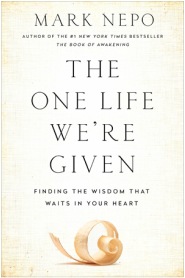 A troubled widower made his way to ask a wise old woman about his troubles. The old woman received him and they walked along a stream. She could see the pain in his face. He began to tremble as he asked, "What's the point? Is there any meaning to life?" She invited him to sit on a large stone near the stream. She took a long branch and swirled it in the water, then replied, "It all depends on what it means to you to be alive." In his sorrow, the man dropped his shoulders and the old woman gave him the branch. "Go on," she said, "touch the branch to the water." As he poked the branch in the running stream, there was something comforting about feeling the water in his hand through the branch. She touched his hand and said, "You see, that you can feel the water without putting your hand in the water, this is what meaning feels like." The troubled man seemed puzzled. She said, "Close your eyes and feel your wife now gone. That you can feel her in your heart without being able to touch her, this is how meaning saves us." The widower began to cry. The old woman put her arm around him, "No one knows how to live or how to die. We only know how to love and how to lose, and how to pick up branches of meaning along the way.
0 Comments
 A delicious story for your Tu b'Shvat gala (puns intended) In a great oak forest where the trees grew tall and majestic, there was a little apple tree. It was the only apple tree in the forest and so it stood alone. Winter came. As the snow fell to the forest floor, it covered the branches of the little apple tree. The forest was quiet and peaceful. One night the little apple tree looked up at the sky and saw a wonderful site. Between the branchesof all the trees, the little apple tree saw the stars in the sky, which appeared to be hanging on the branches of the oak trees. "Oh God oh God," whispered a little apple tree, "how lucky those oak trees are to have such beautiful stars hanging on their branches. I want more than anything in the world to have stars of my branches, just like the oak trees have! Then I would feel truly special! God looked down the little apple tree and said gently, "Have patience! Have patience little apple tree!" Time passed. The snows melted and spring came to the land. Tiny white and pink apple blossoms appeared on the branches of the little apple tree. Birds came to rest on its branches. People walked by the little apple tree and admired it's beautiful blossoms. All summer long, the apple tree continued to grow. The branches of the tree formed a canopy overhead as they filled with leaves and blossoms. But night after night, the little apple tree looked up at the sky with the millions, and millions, and millions - and millions of stars and cried out, "Oh God, I want more than anything in the world to have stars in my tree and on my branches and in my leaves - just like those oak trees." And God looked down at the little apple tree and said, "You already have gifts. Isn't it enough to have shade to offer people, and fragrant blossoms, and branches for birds to nest on so they can sing their song?" The apple tree sighed and answered simply, "Dear God, I don't mean to sound ungrateful, but that is not special enough! I do appreciate how much pleasure I give to others, but what I really want more than anything in the world is to have stars, not blossoms, on my branches that I would feel truly special!" God smiled and answered, "Be patient little apple tree." The seasons changed again. Soon the apple tree was filled with many beautiful apples. People walked in the forest. Whoever saw the apple tree would reach up to pick an apple and eat it. And still, when night came to the forest, the apple tree look at the stars in the oak trees and called out, "Oh God, I want more than anything in the world to have stars in my branches! Then I would feel truly special." And God asked, "But apple tree, isn't it enough that you now have such beautiful apples to offer people? Does that satisfy you? Does that give you enough pleasure and make you feel special? Without saying a word, the apple tree answered by shaking its bracnches from side to side. At that moment, God caused a wind to blow. The great oak trees began to sway and the apple tree began to shake. From the top of the apple tree an apple fell. When it hit the ground, it split open "Look," commanded God, "look inside yourself. What do you see?" The little apple tree looked down and saw that right in the middle of the apple - was a star. And the apple tree answered, "A star! I have a star!" And God laughed a gentlelaugh and added, "So you do have stars on your branches. They've been there all along, you just didn't know it." (Origin unknown. Re-crafted by Peninnah Schram and Rachayl Eckstein Davis in The Chosen Tales)  My mother, Elsie Novak, died on November 6. May her memory be for a blessing My mother, Elsie Novak, died on November 6. May her memory be for a blessing I recall times when as I child I lay sick in bed. My mother would gently rub Vick's VapoRub on my chest, and then cover it with a dry wash cloth. So warm, so soothing, so mentholated. Even now I can feel my mother's hand doing its magic. And when I look at my hands, I see hers - freckled, thin, and yes, aging. If only my hands could pass on comfort as my mother's did. This story took place in the north of Lebanon in the village of Hamadin. And the happening, as told, goes like this: In the village lived a widow and her beautiful daughter, an only child. One day the daughter became ill and was ordered to rest. And so she lay on her bed near the window and looked out at the only tree in the yard. Thus, days, weeks, and months passed, and the autumn came. But the girl's condition didn't improve. On the contrary, she grew worse. And so, one day, as she looked at the tree, she said weakly, "You see, Mother, see those leaves. When the last leaf falls, I will die." The mother's heart grieved, and she watched anxiously as the leaves fell. One cold night the wind howled, and the mother's heart was full of despair, as she saw the wind taking the last leaves. With every leaf her heart sank even deeper. At last there was only one leaf left. What could she do? So the poor woman ran outside, unaware of the cold, the gusts of wind, and the storm. She approached the wall in front of the tree, and there she painted, on the wall, a picture of the last leaf. So good, so accurate was the drawing, that it looked like the last leaf itself. When the girl awoke, she looked out the window, and there she saw one lonely leaf. Days and weeks passed. From time to time she looked out, amd always she saw that last leaf, still hanging on the branch of the tree, A new spirit entered the girl. Slowly, slowly she recovered, and at last she got well. But the mother, by going out on that windy night, had caught cold. She developed tuberculosis, and soon died. When the girl was able to leave her bed, she went outside to see the miracle that had occured: Why had that leaf not fallen? And what did she see? The painting, done by her mother, which had cost her her life for her child's sake. Then the girl realized her mother's great love, and grieved greatly for her mother who, in her own death, had given life to her. The Mother, a Lebanese Folktale, retold by Barbara Rush, from The Jewish Spirit: A Celebration in Stories & Art ººººººººººººººººººººººººººººº
My late rebbe, R' Zalman Schachter-Shalomi, zt"l, (זכר צדיק לברכה) was a master storyteller. He taught, in the name of Abraham Joshua Heschel zt"l: "a mayse is a story in which the soul surprises the mind". "A Year of Stories" is dedicated to his memory. I invite you to forward the link to these stories so that they find their way into the hearts of other listeners and tellers. ∞∞∞∞∞∞∞∞∞∞∞∞∞∞∞∞∞ Please consider offering a tax deductible donation to support this project and the work of DC's Jewish Renewal community Minyan Oneg Shabbat. If you would like to be added to the growing list of "Year of Stories" followers, let me know at [email protected], with "Year of Stories" in the subject line.  This Thursday I head off to Ohalah, what my wife Renée refers to as "a rabbis convention for unconventional rabbis." This will be the first such gathering since the death of Reb Zalman, tz"l, and will then take on special meaning. This post, A Year of Stories #26, marks the 1/2 year since his death on July 3. A few days ago I received in the mail a hardcover copy of Rebbe, the biography of Reb Menachem Schneerson written by Joseph Telushkin. I had not ordered it, so you can imagine my surprise when I discovered a note inside explaining that it was a gift to me from a pair of philantropists who had underwritten the mailing. Wow, that's a lot of bucks - "gimme loot, chasadim!" I immediately looked in the index for Reb Zalman's name, and of course, found a good number of references to him, as he was a musmach (he had been ordained) by the Central Lubavich Yeshiva in 1947. Through the subsequent years Reb Zalman had many interactions with the person who R' Telushkin calls "the most influential rabbi in modern history." Here is a story that Reb Zalman shared with the author about his Rebbe: When Rabbi Zalman Schacter-Shalomi was Hillel director at the University of Manitoba in Winnepeg, Canad, he brought a group of students to meet with the Rebbe in Brooklin. At the conclusion of the rebbe's opening remaks, one of the students, intending to be blunt rather than disrespectful, asked him, "What's a Rebbe good for?" To this day Reb Zalman remembers his feelings at that moment: "I could have sunk through the floor in embarassment." However, the Rebbe didn't seem offended at all and responded to the query directly: "I can't speak about myself, but I can tell you about my own Rebbe (his father in law). For me, my Rebbe was the geologist of the soul. You see, there are so many treasures in the earth. There is gold, there is silver, and there are diamonds. Bit if you don't know where to dig, you'll only find dirt and rocks, and mud. The Rebbe can tell you where to dig, and what to dig for, but the digging you must do for yourself." from Rebbe, by Joseph Telushkin, Pg 209 also, see Reb Zalman's book The Geologist of the Soul: Talks on Rebbe-Craft and Spiritual Leadership ººººººººººººººººººººººººººººº My late rebbe, R' Zalman Schachter-Shalomi, zt"l, (זכר צדיק לברכה) was a master storyteller. He taught, in the name of Abraham Joshua Heschel zt"l: "a mayse is a story in which the soul surprises the mind". "A Year of Stories" is dedicated to his memory. I invite you to forward the link to these stories so that they find their way into the hearts of other listeners and tellers. ∞∞∞∞∞∞∞∞∞∞∞∞∞∞∞∞∞ Please consider offering a tax deductible donation to support this project and the work of DC's Jewish Renewal community Minyan Oneg Shabbat. If you would like to be added to the growing list of "Year of Stories" followers, let me know at [email protected], with "Year of Stories" in the subject line.  This Tuesday I am heading off to attend a silent meditation retreat led by my friend and colleague Rabbi James Jacobsen-Maisels. Years ago this song, Silence, was literally "delivered" to me in whole from somewhere beyond my conscious mind. The song itself is a meditation, and I invite you to close your eyes, breath slowly and deeply, and receive it as I did, in quiet contemplation. Blessings for a light-filled Hanukkah. Silence
Music/Lyrics Mark Novak and angelic shlichim Once upon a time there was the silence Hope was still a memory of future days ahead The waters parted company in silence And heaven kissed the earth so softly snuggled in her bed. The quiet desert moon reflects the silence Stories of the stars are heard in whispers over time Remember how we captured life in silence Drifting off to sleep to images and rhymes. Talking is more often done in silence The thoughts between the lines speak louder than our words Embarrassingly adolescent silence Truth is left unspoken, trembling like a bird. I recall in refuge I took silent So I could hear the beating of my heart reveal my name Where myth is woven peacefully in silence Eyes meet eyes meet ancient eyes - come dance before the flame G!d is resting comfortably in silence. Patiently he waits for us - take comfort, let him in Beauty is revealed to us in silence Returns us to the place where we can all renew again In Silence Silence Silence. ººººººººººººººººººººººººººººº My late rebbe, R' Zalman Schachter-Shalomi, zt"l, (זכר צדיק לברכה) was a master storyteller. He taught, in the name of Abraham Joshua Heschel zt"l: "a mayse is a story in which the soul surprises the mind". "A Year of Stories" is dedicated to his memory. I invite you to forward the link to these stories so that they find their way into the hearts of other listeners and tellers. ∞∞∞∞∞∞∞∞∞∞∞∞∞∞∞∞∞ If you would like to be added to the growing list of "Year of Stories" followers, let me know at [email protected], with "Year of Stories" in the subject line. 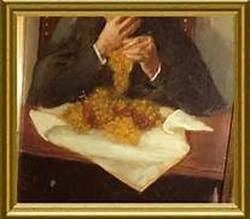 I always wonder about the origin of stories such as this one. The characters could just as easily be Jewish ones, so feel free to substitute characters to suit your tradition...or not. But first, a word from our sponsor.  We have been offered a Matching Grant up to $1500 As of 12/5 only $1364 more to raise by 12/31! Please consider offering a tax deductible donation of $18 or more to support this project and the work of DC's Jewish Renewal community Minyan Oneg Shabbat. All proceeds go to providing us with rental space and the ability to dream a little bigger. We will be forever grape-ful. Thank you. Now here is this week's story. ººººººººººººººººººººººººººººº
One day, a countryman knocked hard on a monastery door. When the monk tending the gates opened up, he was given a magnificent bunch of grapes. "Brother, these are the finest grapes my vineyard has produced. I’ve come to offer them as a gift." "Thank you! I will take them to the Abbot immediately, he will be delighted with this offering." "No", responded the countryman, "I brought them for you. For whenever I knock on the door, it is you opens it. When I needed help because my crop was destroyed by drought, you gave me a piece of bread and a cup of wine every day." The monk slightly bowed his head, and the countryman went on his way. The monk held the cluster of grapes and spent the entire morning admiring it. In reflection, he decided to gift the grapes to the Abbot, for it was the Abbot who always encouraged him with words of wisdom. The Abbot was very pleased with the grapes, and admired their beauty for some time, taking in the color and the shapes. He then recalled that there was a sick brother in the monastery, and thought, “I’ll give him the grapes. Who knows, they may bring him some joy and healing.” And that is what he did. The sick monk was overjoyed, and thanked the Abbot for his generosity. He too was taken by the beauty of the grapes, and saw in them a magnificent work of art, with patterns of repeated themes and slightly variegated colors. He reflected: “The cook has looked after me for so long, feeding me only the best meals. I’m sure he will enjoy these.” The cook was amazed at the beauty of the grapes. He carefully arranged them in a large platter alongside other fruit for the evening meal, and while admiring them, he realized, "These grapes are perfect, so perfect that no one would appreciate them more than the sexton." Many at the monastery considered him a holy man, a mystic, and he would best value this marvel of nature. But the sexton, in turn, gave the grapes as a gift to the youngest novice, that he might understand that the work of G!d is in the smallest details of creation. And when the novice received them, he quietly recalled the first time he came to the monastery, hoping to be among a community of people who knew how to value the wonders of life. He pictured the person who had opened the gates for him. And so, just before nightfall, he took the grapes to the monk at the gate. "Eat and enjoy them", he said. You spend most of your time alone here, these grapes are most deservedly yours. The monk humbly bowed his head and accepted the grapes, as he understood that the gift had always been truly meant for him. He relished each of the grapes, before falling into a pleasant sleep. (Story re-crafted by R' Mark Novak, found here: http://academictips.org/blogs/the-circle-of-joy/ ººººººººººººººººººººººººººººº My late rebbe, R' Zalman Schachter-Shalomi, zt"l, (זכר צדיק לברכה) was a master storyteller. He taught, in the name of Abraham Joshua Heschel zt"l: "a mayse is a story in which the soul surprises the mind". "A Year of Stories" is dedicated to his memory. I invite you to forward the link to these stories so that they find their way into the hearts of other listeners and tellers. ∞∞∞∞∞∞∞∞∞∞∞∞∞∞∞∞∞ If you would like to be added to the growing list of "Year of Stories" followers, let me know at [email protected], with "Year of Stories" in the subject line.  A little girl wanted to meet G!d. She knew it was a long trip to where G!d lived, so she packed her suitcase with chocolate chip cookies and a six pack of root beer and she started her journey. When she had gone about three blocks from her home she saw an old woman, sitting in the park staring blankly, or so it seemed, as some pigeons. The girl sat down next to her and opened her suitcase. She was about to take a drink from her root beer when she noticed that the old woman looked hungry, and the girl offered her a cookie. The old woman gratefully accepted it, and smiled at the girl. Her smile was so pleasant that the girl wanted to see it again, so she offered her a root beer. Again, the old woman smiled at her. The girl was delighted! And so it was, they sat there all afternoon eating and smiling, smiling and eating, never saying a word to each other. As it grew dark, the girl realized how late it was and she got up to leave, but before she had gone more than a few steps, she turned around, ran back to the old woman, and gave her a big hug. In turn, the old woman gave the girl her biggest smile ever. Filled with the warmth of that smile the girl ran home, and a short time later opened the door to her house. Her mother welcomed her home, surprised by the look of joy on the girl's face. She asked, "What did you do today that made you so happy?" She replied, "I had lunch with G!d." And before the mother could respond, she added, "And you know what? She's got the most beautiful smile I've ever seen." Meanwhile, the old woman, radiant with joy, returned to her home. Her son was stunned by the look of peace on her face and asked her, "Mom, what did you do today that made you so happy?" She replied, "I ate cookies in the park with G!d." And before her startled son could respond, she added, "And you know what, she's much younger than I expected." ººººººººººººººººººººººººººººº Please consider offering a tax deductible donation to support this project and the work of DC's Jewish Renewal community Minyan Oneg Shabbat. A shout out to Judy Young for her generous monthly support of this project. ººººººººººººººººººººººººººººº My late rebbe, R' Zalman Schachter-Shalomi, zt"l, (זכר צדיק לברכה) was a master storyteller. He taught, in the name of Abraham Joshua Heschel zt"l: "a mayse is a story in which the soul surprises the mind". "A Year of Stories" is dedicated to his memory. I invite you to forward the link to these stories so that they find their way into the hearts of other listeners and tellers. ∞∞∞∞∞∞∞∞∞∞∞∞∞∞∞∞∞ If you would like to be added to the growing list of "Year of Stories" followers, let me know at [email protected], with "Year of Stories" in the subject line. This is a well known story, from M. Scott Peck's book, The Different Drum. I include it in this series because (a) I like it and (b) it is used so often within the context of community building. Have you ever had the occasion to use it?  The story concerns a monastery that had fallen upon hard times. Once a great order, as a result of waves of antimonastic persecution in the seventeenth and eighteenth centuries and the rise of secularism in the nineteenth, all its branch houses were lost and it had become decimated to the extent that there were only five monks left in the decaying mother house: the abbot and four others, all over seventy in age. Clearly it was a dying order. In the deep woods surrounding the monastery there was a little hut that a rabbi from a nearby town occasionally used for a hermitage. Through their many years of prayer and contemplation the old monks had become a bit psychic, so they could always sense when the rabbi was in his hermitage. "The rabbi is in the woods, the rabbi is in the woods again " they would whisper to each other. As he agonized over the imminent death of his order, it occurred to the abbot at one such time to visit the hermitage and ask the rabbi if by some possible chance he could offer any advice that might save the monastery. The rabbi welcomed the abbot at his hut. But when the abbot explained the purpose of his visit, the rabbi could only commiserate with him. "I know how it is," he exclaimed. "The spirit has gone out of the people. It is the same in my town. Almost no one comes to the synagogue anymore." So the old abbot and the old rabbi wept together. Then they read parts of the Torah and quietly spoke of deep things. The time came when the abbot had to leave. They embraced each other. "It has been a wonderful thing that we should meet after all these years, "the abbot said, "but I have still failed in my purpose for coming here. Is there nothing you can tell me, no piece of advice you can give me that would help me save my dying order?" "No, I am sorry," the rabbi responded. "I have no advice to give. The only thing I can tell you is that the Messiah is one of you." When the abbot returned to the monastery his fellow monks gathered around him to ask, "Well what did the rabbi say?" "He couldn't help," the abbot answered. "We just wept and read the Torah together. The only thing he did say, just as I was leaving --it was something cryptic-- was that the Messiah is one of us. I don't know what he meant." In the days and weeks and months that followed, the old monks pondered this and wondered whether there was any possible significance to the rabbi's words. The Messiah is one of us? Could he possibly have meant one of us monks here at the monastery? If that's the case, which one? Do you suppose he meant the abbot? Yes, if he meant anyone, he probably meant Father Abbot. He has been our leader for more than a generation. On the other hand, he might have meant Brother Thomas. Certainly Brother Thomas is a holy man. Everyone knows that Thomas is a man of light. Certainly he could not have meant Brother Elred! Elred gets crotchety at times. But come to think of it, even though he is a thorn in people's sides, when you look back on it, Elred is virtually always right. Often very right. Maybe the rabbi did mean Brother Elred. But surely not Brother Phillip. Phillip is so passive, a real nobody. But then, almost mysteriously, he has a gift for somehow always being there when you need him. He just magically appears by your side. Maybe Phillip is the Messiah. Of course the rabbi didn't mean me. He couldn't possibly have meant me. I'm just an ordinary person. Yet supposing he did? Suppose I am the Messiah? O God, not me. I couldn't be that much for You, could I? As they contemplated in this manner, the old monks began to treat each other with extraordinary respect on the off chance that one among them might be the Messiah. And on the off off chance that each monk himself might be the Messiah, they began to treat themselves with extraordinary respect. Because the forest in which it was situated was beautiful, it so happened that people still occasionally came to visit the monastery to picnic on its tiny lawn, to wander along some of its paths, even now and then to go into the dilapidated chapel to meditate. As they did so, without even being conscious of it, they sensed the aura of extraordinary respect that now began to surround the five old monks and seemed to radiate out from them and permeate the atmosphere of the place. There was something strangely attractive, even compelling, about it. Hardly knowing why, they began to come back to the monastery more frequently to picnic, to play, to pray. They began to bring their friends to show them this special place. And their friends brought their friends. Then it happened that some of the younger men who came to visit the monastery started to talk more and more with the old monks. After a while one asked if he could join them. Then another. And another. So within a few years the monastery had once again become a thriving order and, thanks to the rabbi's gift, a vibrant center of light and spirituality in the realm. (Author unknown) (Note: I prepared this story before my mother died last Thursday at the age of 98. I will be sharing some of her story with you in the weeks to come) ºººººººººººººººººººººººººººººººººººº My late rebbe, R' Zalman Schachter-Shalomi, zt"l, (זכר צדיק לברכה) was a master storyteller. He taught: "a good story is one where the mind surprises the heart". "A Year of Stories" is dedicated to his memory. I invite you to forward the link to these stories so that they find their way into the hearts of other listeners and tellers. ∞∞∞∞∞∞∞∞∞∞∞∞∞∞∞∞∞ Please consider offering a tax deductible donation to support this project and the work of DC's Jewish Renewal community Minyan Oneg Shabbat. A shout out to Judy Young for her generous offering in support of this project. ≠≠≠≠≠≠≠≠≠≠≠≠≠≠≠≠≠≠ If you would like to be added to the growing list of "Year of Stories" followers, let me know at [email protected], with "Year of Stories" in the subject line. This section from The Velveteen Rabbit is very close to my heart, as it was used in a play written by The Living Stage Theater Company, where I served as music director/workshop leader from 1977 to 1985. Certain moments captured in art never fail to bring me to tears - when Dorothy says good-bye to the scarecrow; when Ray plays catch with his dad; and this. It's my visceral reaction from experiencing Real, face to face. 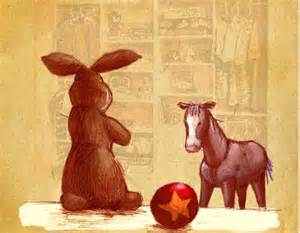 The Skin Horse had lived longer in the nursery than any of the others. He was so old and most of the hairs in his tail had been pulled out to string bead necklaces. For nursery magic is very strange and wonderful, and only those playthings that are old and wise and experienced like the Skin Horse understand all about it. "What is REAL?" asked the Rabbit one day, when they were lying side by side near the nursery fender, before Nana came to tidy the room. "Does it mean having things that buzz inside you and a stick-out handle?" "Real isn't how you are made," said the Skin Horse. "It's a thing that happens to you. When a child loves you for a long, long time, not just to play with, but REALLY loves you, then you become Real." "Does it hurt?" asked the Rabbit. "Sometimes," said the Skin Horse, for he was always truthful. "When you are Real you don't mind being hurt." "Does it happen all at once, like being wound up," he asked, "or bit by bit?" "It doesn't happen all at once," said the Skin Horse. "You become. It takes a long time. That's why it doesn't happen often to people who break easily, or have sharp edges, or who have to be carefully kept. Generally, by the time you are Real, most of your hair has been loved off, and your eyes drop out and you get loose in your joints and very shabby. But these things don't matter at all, because once you are Real you can't be ugly, except to people who don't understand." "I suppose you are real?" said the Rabbit. And then he wished he had not said it, for he thought the Skin Horse might be sensitive. But the Skin Horse only smiled. "The Boy's Uncle made me Real," he said. "That was a great many years ago; but once you are Real you can't become unreal again. It lasts for always." from The Velvetween Rabbit, by Margery Williams ºººººººººººººººººººººººººººººººººººº My late rebbe, R' Zalman Schachter-Shalomi, zt"l, (זכר צדיק לברכה) was a master storyteller. He taught: "a good story is one where the mind surprises the heart". "A Year of Stories" is dedicated to his memory. I invite you to forward the link to these stories so that they find their way into the hearts of other listeners and tellers. ∞∞∞∞∞∞∞∞∞∞∞∞∞∞∞∞∞ Please consider offering a tax deductible donation to support this project and the work of DC's Jewish Renewal community Minyan Oneg Shabbat. A shout out to Judy Young for her generous offering in support of this project. ≠≠≠≠≠≠≠≠≠≠≠≠≠≠≠≠≠≠ If you would like to be added to the growing list of "Year of Stories" followers, let me know at [email protected], with "Year of Stories" in the subject line. 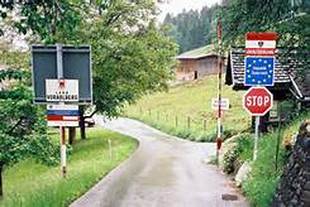 There was once a Swiss guard who worked at the border of Austria. He had worked there for many years and took a great deal of pride in his work. One morning an Austrian man arrived at the border, riding a bicycle. On the front of the bike was a basket filled with sand. The guard eyed the man suspiciously, and suspecting that the Austrian might be a smuggler, brought out a special comb he kept for just a purpose, and began to sift through the sand in the basket. He found nothing, only sand, and waved the man through the gate. The same thing happened the next month, as the Austrian arrived on a bicycle with the basket filled with sand. The border guard went through the same process, at first eyeing the Austrian with suspicion, then sifting through the sand with his special comb, and until, finding nothing, allowing the Austrian to again cross the border. The scene repeated itself month after month, year after year. During this time the border guard engaged the Austrian in small talk - learning his name (it was Yosef) learning about his family (he was married with a wife, who was a school teacher, and had 2 children), and of course his reason for crossing the border (to visit a favorite aunt and uncle). Each month they exchanged pleasantries, and as time passed the border guard still remained suspicious, and though he never found anything, he kept on looking... month after month...for 30 years! Finally, one day, the Swiss guard said to the Austrian man, "I must ask you a question that has been on my mind many years. This is my last day of work - I am retiring. After all these years, I still suspect you have been a smuggler, and it is driving me near mad. Now I ask you - I must know - are you indeed a smuggler?" The Austrian man hesitated, and the Swiss guard reassured him. "Do not worry - I give you my word of honor that I will not arrest you. But for my own peace of mind, I must know." "Very well," said the Austrian. "Then I will tell you - I am indeed a smuggler." "Ha ha," laughed the guard, relieved at last to know that his suspicions had not been unfounded. "I knew it!" He hesitated for a moment and then continued, "But each month I looked through your basket and found nothing but sand. Tell me, please, what have you been smuggling?" And with eyes smiling, the Austrian replied, "Bicycles." (Story re-crafted by R' Mark Novak) My late rebbe, R' Zalman Schachter-Shalomi, zt"l, (זכר צדיק לברכה) was a master storyteller. He taught: "a good story is one where the mind surprises the heart". "A Year of Stories" is dedicated to his memory. I invite you to forward the link to these stories so that they find their way into the hearts of other listeners and tellers.
∞∞∞∞∞∞∞∞∞∞∞∞∞∞∞∞∞ Please consider offering a tax deductible donation to support this project and the work of DC's Jewish Renewal community Minyan Oneg Shabbat. A shout out to Judy Young for her generous offering. ≠≠≠≠≠≠≠≠≠≠≠≠≠≠≠≠≠ If you would like to be added to the growing list of "Year of Stories" followers, let me know at [email protected], with "Year of Stories" in the subject line.
And here's yet another explanation!
While aboard his ark, Noah assigned the two dogs responsibility for patrolling the ark. It was the dogs' job to check on all the other animals, and to report back to Noah and his wife Na’ama. This included using their superior sense of smell to detect anything that was, let us say, kind of fishy. One day, the dogs were taking their daily stroll when they noticed a coin-sized leak, through which water was rushing in at a rapid rate. They looked at each other and knew instinctively what to do. One dog ran for help, while the other dog gallantly stuck her nose in the hole to plug up the leak. In what seemed like an eternity, Noah and Na'ama came running, to find the poor dog in great pain and gasping for breath. They immediately relieved him of her duties and quickly filled the hole with pitch, averting what could have been a major disaster. After the work was completed, Noah and Na'ama pawsed, and realizing what a ruff experience it had been, spoke to the dog saying "Little dog, you kept us all safe - our family, and all the animals - with your little nose. All future generations will know of your great deed, as your nose will always be cold and wet, just as it is today." This tail is done, and now you know another story explaining why dog's nose has fur-ever remained cold and wet! (Origin unknown - retold by R' Mark Novak, silly wabbit) ºººººººººººººººººººººººººººººººººººº My late rebbe, R' Zalman Schachter-Shalomi, zt"l, (זכר צדיק לברכה) was a master storyteller. He taught: "a good story is one where the mind surprises the heart". "A Year of Stories" is dedicated to his memory. I invite you to forward the link to these stories so that they find their way into the hearts of other listeners and tellers. ∞∞∞∞∞∞∞∞∞∞∞∞∞∞∞∞∞ Please consider offering a tax deductible donation to support this project and the work of DC's Jewish Renewal community Minyan Oneg Shabbat. A shout out to Judy Young for your generous offering in support of this project. ≠≠≠≠≠≠≠≠≠≠≠≠≠≠≠≠≠≠ If you would like to be added to the growing list of "Year of Stories" followers, let me know at [email protected], with "Year of Stories" in the subject line.  My late rebbe, R' Zalman Schachter-Shalomi, zt"l, (זכר צדיק לברכה) was a master storyteller. He taught: "a good story is one where the mind surprises the heart". "A Year of Stories" is dedicated to his memory. I invite you to forward the link to these stories so that they find their way into the hearts of other listeners and tellers. ∞∞∞∞∞∞∞∞∞∞∞∞∞∞∞∞∞∞∞∞∞∞∞∞∞∞∞∞∞∞ A man woke up in confusion every morning. He never remembered where he put his clothes the night before, and every morning he would spend a lot of time searching for the things he needed to put on. One night he hit upon a brilliant idea. He exclaimed, "I need a system! I must have an accounting for everything." And so that evening he made a list, writing down the exact location of each article of his clothing. He then pinned the note on his pillow, and fell asleep. When he awoke the next morning the first thing he saw was the list. He immediately reached for it and with the note in hand, he confidently rose from his bed and read the list aloud. "Pants - bedpost. Check. Shoes - under the bed. Check. Socks - in the shoes. Check." As he checked off each article of clothing, he put them on - one by one - until he reached the last of the items. "Cap - doorknob. Check!" With a final flourish, he placed the cap on top of his head, and smiled. "There, I did it, it worked!" In the next moment however his smile turned to concern, for as he checked the list one last time he realized that something was missing. "Hmmm....," he wondered. "Where am I?" ******************* Story re-crafted by R' Mark Novak from a version found in The Stories We Pray by Joel Luric Grishaver, who crafted his version from Chasidic Tales Re-Told, edited by Edith Samuel and prepared by R' Harvey Fields (out of print). A personal note: When a storyteller follows up a story by telling the listener what it means, my heart sinks and my mind withdraws. I leave it to you, gentle reader, to place these stories into the context of your personal journey, gleaning whatever meaning or interpretation resonates within. ***************** Let me know if you use the story and in what context. And......I'd love to hear YOUR stories! And if you are enjoying these stories/teachings and would like to support our work please consider offering a tax deductible donation to DC's Jewish Renewal community, Minyan Oneg Shabbat. Thank you. ***************** If you would like to be added to the growing list of "Year of Stories" followers, let me know at [email protected], with "Year of Stories" in the subject line. A Tale from India, China, or some say Stanislav
Re-crafted by R' Mark Novak from various sources There was a water-bearer who had two large pots, one hung on each end of a pole, which she carried on a yoke across her neck. One of the pots had a crack in it, while the other was as perfect as the day it was crafted. And each day the water-bearer would draw water from the stream and return up the long, narrow pathway to her mistress’s house. Each day as she made her steep climb. By the time she returned to the house the pot with the crack had leaked half its water . The other pot remained full, always delivering a full portion. This went on daily for days, months, years - with the water-bearer delivering only one and a half pots full of water to her mistress’s house. And then one day, as they stood at the edge of the river, the cracked pot apologized to the water-bearer for its imperfection. After years of arriving half-empty and feeling guilty, it spilled its heart out. "I am so very sorry, and I want to apologize to you.” “What do you have to be sorry for?” asked the water-bearer. “I am ashamed that I can’t accomplish what I was fashioned to do. I am ashamed because the crack in my side causes water to leak out all the way back to your mistress’s house. Look at your other bucket - he doesn’t leak. I don’t know why you didn’t use me for kindling a long time ago. What good is a bucket that leaks? With great compassion, the water-bearer replied, “Let us return to the house, and as we walk, you will look and see.” And so they did, and as they progressed up the hill, the water-bearer made a grand gesture toward the ground beneath the bucket, pointing out the same path that they had walked for years. “Look at your side of the path - the yellow daises, the red nasurtium, , the pink and purple asters.” The water-bearer then turned her body, so that the pot could see the other side of the path. “Now, look at the other side - it is nothing but gravel and dirt.” “I don’t understand,” said the cracked pot. The water-bearer smiled. “ I planted flower seeds on your side of the path, and every day as we returned from the stream, you watered them. The seeds sprouted and grew, and every day I return to pick beautiful flowers to adorn my mistress’s table. If you were not just the way you are, she would not have such beauty to grace her house.” ***************** Please let me know if you use the story and in what context. I'd love to hear YOUR stories. Enjoy a beautiful animated version of the story at https://www.youtube.com/watch?v=h9Z60Msvm3c ***************** My late rebbe, R' Zalman Schachter-Shalomi, zt"l, (זכר צדיק לברכה) was a master storyteller. He taught: "a good story is one where the mind surprises the heart". "A Year of Stories" is dedicated to his memory. I invite you to forward the link to these stories so that they find their way into the hearts of other tellers and listeners. ***************** And if you are enjoying these stories/teachings and would like to support our work please consider offering a tax deductible donation to DC's Jewish Renewal community, Minyan Oneg Shabbat. Thank you. ***************** If you would like to be added to the growing list of "Year of Stories" followers, let me know at [email protected], with "Year of Stories" in the subject line.  There once was a Jew who went out into the world to seek justice. Somewhere, he was certain, true justice must exist, but he had never found it. So he set out on a quest that lasted for many years. He went from town to town and village to village, and everywhere he went, he searched for justice, but never did he find it. In this way many years passed, until the man had explored all of the known world except for one last, great forest. He entered that dark forest without hesitation, for by now he was fearless, and he went everywhere in it. He went into the caves of the thieves, but they mocked him, and said, "Do you expect to find justice here?" And he went into the huts of witches, where they were stirring their brews, but they laughed at him and said, "Do you expect to find justice here?" The man went deeper and deeper into that forest, until at last he arrived at a little clay hut. Through the window he saw many flickering flames, and he was curious about them. So he went to the door and knocked. No answer. He knocked again. Nothing. At last he pushed the door open and stepped inside. Now, as soon as he stepped inside that cottage, the man realized that it was much larger on the inside than it had seemed to be from the outside. It was filled with hundreds of shelves, and on every shelf there were dozens of oil candles. Some of those candles were in precious holders of gold or silver or marble, and some were in cheap holders of clay or tin. And some of the holders were filled with oil and the flames burned brightly, while others had very little oil left. All at once, an old man, with a long white beard, wearing a white robe, appeared before him. “Shalom aleichem, my son,” the old man said. “How can I help you?” The man replied, “Aleichem shalom. I have gone everywhere searching for justice, but never have I seen anything like this. Tell me, what are all these candles?”. The old man said, “each of these candles is the candle of a person’s soul. As long as the candle continues to burn that person remains alive. But when the candle burns out that persons soul takes leave of this world.” The man asked, “can you show me the candle of my soul?” “Follow me,” the old man said, and he led him through that long labyrinth of a cottage, which the man now saw must be endless. At last they reached a low shelf, and there the old man pointed to a candle in a holder of clay and said, “that is the candle of your soul.” Now the man took one look at that flickering candle, and a great fear fell upon him, for the wick of that candle was very short, and there was very little oil and it looked as if it any moment the week would slide into the oil and sputter out. He began to tremble. Could the end be so near without his knowing it? Then he noticed the candle next to his own, also in a clay holder, but that one was full of oil, and its wick was long and straight and its flame burned brightly. “And whose candle is that?” The man asked. “I can only reveal each man’s candle to himself alone,” the old man said, and he turned and left. The man stood there, quaking. All at once he heard a sputtering sound, and when he looked up, he saw smoke rising from another shelf, and he knew that somewhere, someone was no longer among the living. He looked back at his own candle and saw that there were only a few drops of oil left. Then he looked again at the candle next to his own, so full of oil, and a terrible thought entered his mind. He stepped back and searched for the old man in every corner of the cottage, but he didn’t see him anywhere. Then he picked up the candle next to his own and lifted it up above his own. At that instant the old man appeared out of nowhere and grabbed his arm with a group like iron. And the old man said: “Is this the kind of justice you are seeking?” ****************Note: This is where I end the story when I tell it. The story as written continues for one more paragraph. Which version do you prefer, and why? The man closed his eyes because it hurt so much. And when he opened his eyes, he saw that the old man was gone, and the cottage and the candles had all disappeared. And he found himself standing alone in the forest and he heard the trees whispering his fate. And he wondered, had his candle burned out? Was he, too, no longer among the living? (Story as crafted by Howard Schwartz in his must-have-in-your-library, Tree of Souls, Pg 43-45. Howard notes two verses from Tanach that resonate through this story: צדק צדק תרדוף (Deut 16:20) and נֵר יְהוָה, נִשְׁמַת אָדָם (Proverbs 20:27). Beautiful. ***************** My late rebbe, R' Zalman Schachter-Shalomi, zt"l, (זכר צדיק לברכה) was a master storyteller. He taught: "a good story is one where the mind surprises the heart". "A Year of Stories" is dedicated to his memory. I invite you to forward the link to these stories so that they find their way into the hearts of other tellers and listeners. ***************** And if you are enjoying these stories/teachings and would like to support our work please consider offering a tax deductible donation to DC's Jewish Renewal community, Minyan Oneg Shabbat. Thank you. ***************** If you would like to be added to the growing list of "Year of Stories" followers, let me know at [email protected], with "Year of Stories" in the subject line.
*******************
My late rebbe, R' Zalman Schachter-Shalomi, zt"l, (זכר צדיק לברכה) was a master storyteller. He taught: "a good story is one where the mind surprises the heart". "A Year of Stories" is dedicated to his memory. I invite you to forward the link to these stories so that they find their way into the hearts of other tellers and listeners. ******************* If you would like to be added to the growing list of "Year of Stories" followers, let me know at [email protected], with "Year of Stories" in the subject line. ******************* And if you are enjoying these stories/teachings and would like to support our work please consider offering a tax deductible donation to DC's Jewish Renewal community, Minyan Oneg Shabbat. Thank you.  There was once a great rabbi, the sage of his age. A more righteous person was not to be found in his generation. He gathered his disciples, looked at each in turn, smiled, and breathed his last. A few days later, his chief disciple has a dream. In his dream, the rebbe was returning to be recyled into this world. "Rebbe!" the disciple said in alarm, "why are you coming back? You lived the most perfect of lives! What is there that could possibly have been left undone?" The rebbe smiled at the disciple in his dream, and said, "Do you remember when I was dying and you and all of my finest students gathered around my bed? Do you remember when I looked at each of you, and then I closed my eyes and smiled? Well. in that moment, I reviewed my entire life, and I saw that any opportunity there had been to learn a word of Torah, I had learned. And any opportunity there had been to do a mitzvah, I had done it. With that I breathed a sigh of satisfaction and my soul left my body." The disciple asked, "So rebbe, where was the imperfection?" "In that moment of satisfaction" (Story from R' Mitch Chefitz's The Seventh Telling. Please share other citations) ******************* My late rebbe, R' Zalman Schachter-Shalomi, zt"l, (זכר צדיק לברכה) was a master storyteller. He taught: "a good story is one where the mind surprises the heart". "A Year of Stories" is dedicated to his memory. I invite you to forward the link to these stories so that they find their way into the hearts of other tellers and listeners. ******************* If you would like to be added to the growing list of "Year of Stories" followers, let me know at [email protected], with "Year of Stories" in the subject line. *************** A personal note: When a storyteller follows up a story by telling the listener what it means, my heart sinks and my mind withdraws. I leave it to you, gentle reader, to place these stories into the context of your personal journey, gleaning whatever meaning or interpretation resonates within. 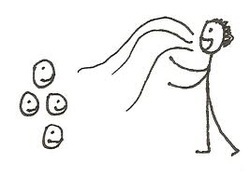 My late rebbe, R' Zalman Schacter-Shalomi, zt"l, (זכר צדיק לברכה) was a master storyteller. He taught: "a good story is one where the mind surprises the heart". "A Year of Stories" is dedicated to his memory. I invite you to forward the link to these stories so that they find their way into the hearts of other tellers and listeners. ^^^^^^^^^^^^^^^^^^^^^^^^^^^^^^^^^^^^^ In her book, The December Project, writer Sara Davidson shared this from one of her many meetings with Reb Zalman: He quoted Woody Allen, who said, “I don’t mind dying, I just don’t want to be there when it happens.” But Reb Zalman said “I do want to be there. It’s such a holy moment… I want to watch the last breath going out and whisper the Shema. I want to merge back with the infinite… like a drop in the greater ocean.” With that intention in mind - this week's story. (No story next week kiddies, we'll bedriving our daughter Kaziah to her fresh(wo)man adventure at Mt. Holyoke) ************************************ Once upon a time there was a little wave. The wave loved being a wave, bobbing along in the ocean, up and down, all day and all night. He enjoyed the wind and the fresh air, surrounded by lots of other waves, who he enjoyed watching and playing with. Then one day, the little wave noticed that something seemed to be happening to the waves in front of it. It noticed that it, along with all the other waves, was coming up to something big… the end of the ocean. The little wave saw a wave in front of it going up, higher and higher. That wave was filled with light and it was as high as it could possibly go (which was the best part of being a wave)… and then it came crashing down and smashed into bits. My God, this is terrible”, the wave said, “look what’s going to happen to me.” The little wave saw another wave in front of it do the same thing… going way up high and then come crashing down. The little wave saw this and became very afraid. A voice called out to him from amidst the sea, “Why do you look so sad?” The little wave answered, “Don’t you get it? We’re all going to crash! All of us waves are going to be nothing! Isn’t it terrible?” The voice remained calm, saying, “No, you don’t understand. You’re not only a little wave, you’re part of the ocean. You’re not only a little wave, you’re part of the ocean.” And in that moment, the little wave trickled onto the beach, and then turning, rolled back into the ocean. (I shaped this version of the story from a version that I have together with the short version that appears in Mitch Albom's Tuesdays with Morrie, Pg. 179) ******************* If you would like to be added to the growing list of "Year of Stories" followers, let me know at [email protected], with "Year of Stories" in the subject line. *************** A personal note: When a storyteller follows up a story by telling the listener what it means, my heart sinks and my mind withdraws. I leave it to you, gentle reader, to place these stories into the context of your personal journey, gleaning whatever meaning or interpretation resonates within. 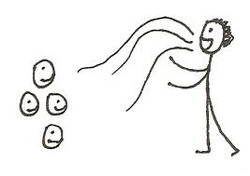 My late rebbe, R' Zalman Schacter-Shalomi, zt"l, (זכר צדיק לברכה) was a master storyteller. He taught: "a good story is one where the mind surprises the heart". "A Year of Stories" is dedicated to his memory. I invite you to forward the link to these stories so that they find their way into the hearts of other tellers and listeners. Tu b'Av was on Monday, and inspired me to post a love story - this time one for you to listen to. It is told by me and my b'shert, Renée Brachfeld, on our CD King Solomon's Daughter. I can tell you excactly where we heard it for the first time - under the chuppah at our wedding in 1993. It was translated from Sefer Tanchuma by Rabbi Jack Moline, and he spun the tale while inviting all of our family and friends to sing Od Yishama, which he wove throughout the story. So sit back for the next 11 minutes and enjoy this sweet tale of a love that was meant to be.. A variant written version of the story can be found here. Next week we'll return to a written story, but stay tuned for more stories in audio form. ***************
If you would like to be added to the growing list of "Year of Stories" followers, let me know at [email protected], with "Year of Stories" in the subject line. *************** A personal note: When a storyteller follows up a story by telling the listener what it means, my heart sinks and my mind withdraws. I leave it to you, gentle reader, to place these stories into the context of your personal journey, gleaning whatever meaning or interpretation resonates within.
One day the Baal Shem Tov sits at his table with his people. The weather is getting cold, but he says, "Get the wagon together, and make sure you bring some lekach and some bronfen (cake and spirits), and come with me." So they get into the wagon, and after a time they come to an inn. The Baal Shem says to the innkeeper, "Can you prepare for a wedding?"
And the innkeeper says, "Yes, of course. How many people?" "Not too many people, "the Baal Shem replied, "but we'll need a nice meal." "No problem," the innkeeper says, "I'll send over to another fellow who has a roadhouse a little further on, so he and his wife can come and help. I'm a little short-staffed right now," he explains. "I usually have a young woman and a young man here to help me, but they're off today, the two of them." "Where did they go?" the Baal Shem says. "Well, they're about to get married, and today they went to the town to buy what they need for their new home together. They've been saving up for years." "Very good," the Baal Shem says, "All right, start preparing." Meanwhile, the young couple are on their way to town. No sooner do they get to the market when they see a family being dragged through the streets in chains. The town crier shouts in front of them, "These people haven't paid their rent to the landlord! They are going to be put into the darkest jail until they rot there and die!" The couple are appalled. "How much do they owe?" they ask the town crier. "Three hundred rubles," he says. Three hunderd rubles! It is all they have. But he looks at her and she looks at him, and yes, they take off their money belts and give everything they have to redeem the family. Before the family have even recovered enough to thank them, the couple are gone. On their way back they agree: "We can't tell the people that we gave away all our hard-earned money: they'll call us fools! Let's rough each other up a little, and when we get back we'll say that robbers fell on us and took our money." So they came back bruised and empty-handed to find the inn in an uproar, preparing for a wedding as the Baal Shem had requested. The innkeeper rushes up and says, "Good, you're here! Quick, I need help setting up - oy, vey, what happened to you? Where's the furniture?" And they tell him the whole tale of woe. At this, the Baal Shem calls them both aside and says, "It's your wedding that we're preparing for, and I am here to marry you myself." And so they were married. Now it was the custom that the guests at a wedding would say a droshe geshank, a little speech announcing the present that each guest is giving to the couple. "I give a pair of handsome brass candlesticks," one of the innkeepers says. "I'm going to give a baking trough," says another. At some point they return to the Baal Shem. "What about you, Rabbi?" And the Baal Shem says, "To the groom I give the estate of Count Potptzki. To the bride, I give Countess Potozki's jewelry." All the guests laugh uproariously and they continue with their meal and the seven traditional blessings. Suddenly before dessert is on the table, the Baal Shem says to the couple, "You must leave now, right away. Get on your wagon and horse and go." "Where should we go?" "Into the forest. Go." In the meantine a snowstorm has started, a blizzard. The couple are in the midde of the forest and lose their way. All of a sudden, the horse rears up and refuses to go a step farther, When they peer ahead to see what the problem is, they see the body of a young boy lying in the snow. They dismount quickly and pick him up. He's still alive, and they rub him all over and give him some schnapps and the lekach that the Baal Shem Tov gave them for the way. "Who are you?" they ask the boy. "Where are your parents?" "I am the son of the Count and Countess Potozki," the boy tells the. I received a new horse for my birthday, but the horse threw me off and I don't remember anything after that." And he points them to the castle of the Count. Meanwhile the Count and and his wife are beside themselves with worry. The horse they'd bought for their son had returned without its rider. The Count's followers had been unable to find the boy in the worsening storm, and the weather was getting so bad that they were afraid to continue. Finally, in desperation, the count said, "I pledge my entire estate to the person who brings back my son." "And I pledge my jewelry as well!" says the countess. Just then the couple arrives with the boy on their horse. And that's how the Baal Shem's drosha geshank to that couple, who had given all their money away to redeem a captive family, came to pass. * * * * * * * * * * * * * In the book, Reb Zalman tells us that this is an example of a good story for a melaveh malka, a post-Shabbas Saturday night gathering. Why? Because he explains that "embedded in these tales was the message that any one of us, with no warning or preparation, may be presented with the opportunity to serve as the Holy One's instrument to improve the world - if we rise to the occasion. This vision, this mystic ideal, this high ambition, is what we take forward with us into the week" (Jewish With Feeling Pg. 74) * * * * * * * * * * * * * If you would like to be added to the growing list of "Year of Stories" followers, let me know at [email protected], with "Year of Stories" in the subject line. * * * * * * * * * * * * * A personal note: When a storyteller follows up a story by telling the listener what it means, my heart sinks and my mind withdraws. In this case however, I could not resist. It's a machaya to have been given the sod (secret) from Reb Zalman. * * * * * * * * * * * * * Question: Is the horse the same horse as in story #3? :>) The Optimist and The Pessimist 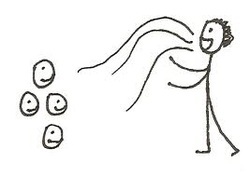 My late rebbe, R' Zalman Schacter-Shalomi, zt"l, (זכר צדיק לברכה) was a master storyteller. He taught: "a good story is one where the mind surprises the heart". "A Year of Stories" is dedicated to his memory. I invite you to forward the link to these stories so that they find their way into the hearts of other tellers and listeners. ∞ ∞ ∞ ∞ ∞ ∞ ∞ ∞ ∞ ∞ ∞ ∞ ∞ ∞ ∞ ∞ ∞ ∞ ∞ ∞ ∞ ∞ There once lived a king who had twin sons. Though they looked exactly alike, their personalities were different as night and day. One was a devout pessimist, the other an incurable optimist. When they came of age, the king decided it was time to open their eyes to the other side of life, and he planned to do so through the gift that he would give to each of them. For the pessimist, he went to the royal jeweler. "I would like him to have the finest watch ever made", he said. "Money is no object - jewels, diamonds, gold, platinum- the best. And I want it ready by his birthday." For the optimist, he went to the Palace Gardener. "When he wakes up on the morning of his birthday, I want him to see, at the foot of his bed, a huge pile of manure." The birthday arrived, and the king, with great anticipation, went to see his pessimistic son. He found him sitting glumly on his bed, holding a magnificent watch. "How do you like your gift?" asked the king. "It's all right," said the pessimist. "But it's really rather gaudy. And even if it wasn't, it's the sort of thing that will probably get stolen, or I might break it or worse, I might lose it." The king had heard enough and went off to visit the room of the sunny optimist. As he approached he heard singing and laughter teeming from the room, and when he entered, he found his son dancing with joy. When his father entered the room, the son ran up and hugged him. "Oh, thank you, father, thank you! It's just what I wanted!" Bewildered, the king asked his son, "Just what are you thanking me for?" "Why father", the son cried out with glee, "for the horse!" (Retold by R' Mark Novak - origin unknown - please let me kmow if you have a source) ******************* If you would like to be added to the growing list of "Year of Stories" followers, let me know at [email protected], with "Year of Stories" in the subject line. ******************* A personal note: When a storyteller follows up a story by telling the listener what it means, my heart sinks and my mind withdraws. I leave it to you, gentle reader, to place these stories into the context of your personal journey, gleaning whatever meaning or interpretation resonates within. |
Mark Novak is a "free-range" rabbi who lives in Washington DC and works, well, just about everywhere. In 2012 he founded Minyan Oneg Shabbat, home to MOSH (Minyan Oneg Shabbat), MindfulMOSH (Jewish mindfulness gathering), and Archives
June 2017
Categories
All
|


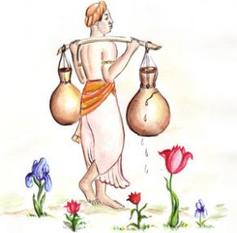

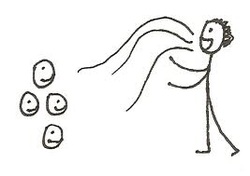
 RSS Feed
RSS Feed
